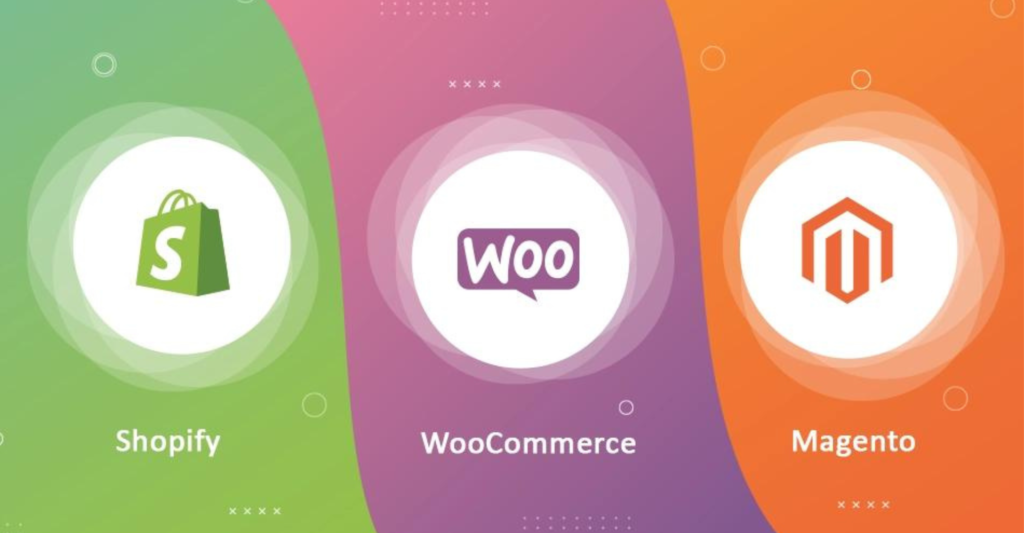Choosing the right eCommerce platform is crucial for the success of your online store. Among the many options available, Shopify, WooCommerce, and Magento stand out as some of the most popular choices. Each platform offers unique features and advantages, making it important to understand their differences to make an informed decision. Let’s compare Shopify, WooCommerce, and Magento to help you choose the best platform for your business.
1. Shopify
Shopify is a fully hosted eCommerce platform that simplifies the process of setting up and managing an online store. It’s known for its user-friendly interface and robust feature set.
Pros:
- Ease of Use: Shopify’s intuitive interface makes it easy for beginners to set up and manage their store without any technical knowledge.
- Hosting and Security: As a hosted solution, Shopify takes care of hosting, security, and maintenance, allowing you to focus on your business.
- App Store: Shopify offers a vast app store with integrations and add-ons to extend your store’s functionality.
- Customer Support: 24/7 customer support is available via live chat, email, and phone.
Cons:
- Cost: Shopify’s monthly subscription fees can add up, especially when factoring in transaction fees for third-party payment gateways.
- Limited Customization: While Shopify is customizable, it has some limitations compared to open-source platforms like WooCommerce and Magento.
2. WooCommerce
WooCommerce is a free, open-source eCommerce plugin for WordPress. It’s a popular choice for businesses already using WordPress or those looking for a highly customizable solution.
Pros:
- Cost-Effective: WooCommerce is free to use, although you will need to pay for hosting, themes, and extensions.
- Customization: As an open-source platform, WooCommerce offers extensive customization options and flexibility.
- Integration with WordPress: Seamlessly integrates with WordPress, providing access to a vast library of plugins and themes.
- Control: Full control over your store’s data, design, and functionality.
Cons:
- Technical Knowledge Required: Setting up and managing a WooCommerce store may require some technical skills, especially for complex customizations.
- Maintenance: As a self-hosted solution, you are responsible for hosting, security, and updates.
3. Magento
Magento is a powerful, open-source eCommerce platform designed for larger businesses and enterprises. It offers extensive features and scalability for complex online stores.
Pros:
- Scalability: Magento is highly scalable, making it suitable for large businesses with extensive product catalogs and high traffic volumes.
- Customization: Extensive customization options allow for a tailored shopping experience.
- Features: Rich feature set, including advanced SEO, marketing tools, and multi-store capabilities.
- Community: Strong community support and a wide range of extensions and themes.
Cons:
- Complexity: Magento’s complexity can be overwhelming for small businesses or those without technical expertise.
- Cost: While the open-source version is free, Magento Commerce (the enterprise version) can be quite expensive.
- Resource-Intensive: Requires robust hosting and regular maintenance, which can be costly.
Which Platform is Right for You?
The best eCommerce platform for your business depends on your specific needs, budget, and technical expertise.
- Shopify: Ideal for small to medium-sized businesses looking for an easy-to-use, fully hosted solution with excellent support.
- WooCommerce: Best for businesses already using WordPress or those who want a highly customizable and cost-effective solution.
- Magento: Suited for large businesses and enterprises with complex needs and the resources to manage a powerful, scalable platform.
Ultimately, each platform has its strengths and weaknesses. Assess your business requirements, budget, and technical capabilities to choose the platform that best aligns with your goals. By selecting the right eCommerce platform, you can create a robust online store that drives growth and success for your business.







